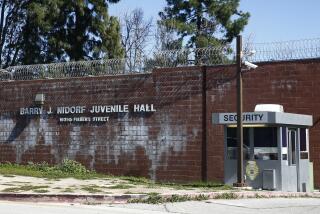Young Offenders March Into Boot Camp : Probation: Mendenhall and Munz facilities hold open house to show how military-style regimentation can help juveniles who have had trouble with drugs.
Ron, a 17-year-old convicted of burglary and drug possession, recalled with slight exasperation the first day he and other Los Angeles County juvenile prisoners were taught to march like soldiers.
The drill instructor barked, “Right face.” Some turned right, others did not. “Some didn’t know their left from their right,” Ron said.
But Monday morning, seven weeks later, Ron and 213 other juvenile offenders at the Mendenhall and Munz county probation camps marched smartly and correctly during an open house the Probation Department held to publicize its new military-style “boot camps.”
The program combines military regimentation and physical conditioning with drug education classes. County officials hope the program will instill discipline in young men who have led restless and sometimes violent lives.
Although boot camp training has been used for adult prisoners across the country with varying effectiveness, the county program is believed to be the first in the United States targeting juveniles and drug abuse, said Harold A. Garrison Jr., director of Camp Mendenhall. The two camps are intended exclusively for youths who have had trouble with drugs.
About 100 officials from the county’s Probation Department, joined by Supervisor Mike Antonovich, gathered Monday at Camp Mendenhall, located next to Camp Munz high in Angeles National Forest, about 35 miles north of Van Nuys. The Board of Supervisors, at the urging of Antonovich last December, approved $1 million for the new program and six extra probation officers.
County probation camps have existed for decades as places where juveniles could take classes toward high school diplomas or learn trades. The county has 20 such camps housing 4,000 offenders under age 18. Garrison said other camps could be converted to the “boot camp” regimen if it succeeds at Mendenhall and Munz.
Success will be measured by monitoring offenders after they are released to see whether they stay in school and out of trouble. After leaving the camps, the youths will enter a private drug rehabilitation program and will have their progress watched by probation officers for at least six months.
The drug education program, for the youths and their parents, is vital because it could cut down the number of repeat offenders, said Barry J. Nidorf, the county’s chief probation officer. Antonovich noted that about 75% of the young men at probation camps countywide have used drugs.
In another departure from current practice, the six officers assigned to the boot camps will begin working with the boys before they return home, allowing them to build personal relationships, said Ed Anhalt, director of Camp Munz.
Most probation officers typically keep track of 100 to 300 offenders, but the officers assigned to the boot camps will supervise only about 35.
Some Probation Department employees complained privately that too much attention has been focused on the military training, calling it a way to grab headlines. The real value of the new program, they said, is in the drug education and extra probation officers.
Indeed, some changes at the camps are mostly cosmetic. Dormitories are now called barracks and the cafeteria is the mess hall. Blue jeans and ugly work boots have been replaced by sharply pressed khaki trousers and shiny black boots.
But Garrison, Anhalt and many of the youths said the boot camp philosophy has meant more than just learning how to march in step.
Mike, a 16-year-old convicted of burglary and grand auto theft, said he had no discipline until arriving at Camp Munz three months ago. He rarely attended school, usually sleeping in after his mother went to work. He began stealing to buy drugs.
He stole a car at 15, before learning how to drive, and practiced up and down the streets of Burbank until a police cruiser pulled up behind him. Mike led police on a wild chase. “I felt like I was in the movies,” he said, until he crashed into two utility poles.
But now Mike wants to graduate from high school. Camp Munz has taught him something about himself, he said. “I know I don’t want to come back.”
Today the Sheriff’s Department will unveil a rigorous boot camp for adults at the Peter J. Pitchess Honor Rancho in Castaic. That camp, planned for five years, is not connected to the juvenile program.
More to Read
Sign up for Essential California
The most important California stories and recommendations in your inbox every morning.
You may occasionally receive promotional content from the Los Angeles Times.









